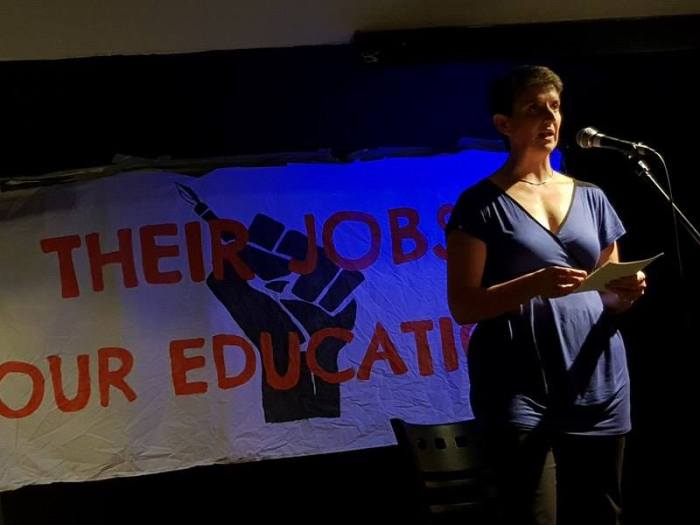
I was very pleased to be one of the speakers at an event last night, organised by the Aberdeen Student Left and English Literature Society. It was a fantastic evening, with poetry, comedy, music, and of course, politics, designed to raise awareness of and money for the National Demo for Free Education taking place in London on 15th November.
As Rector of Aberdeen University, I have been very pleased to support campaigns against tuition fees and also to stand in solidarity with staff against redundancies. As a long time member of NCAFC – the National Campaign Against Fees and Cuts – and a trade unionist, I firmly believe that education is a right that should be accessible to everyone. I also know only too well the negative impact redundancies has on students and their education. With the disaster for Higher Education that is Brexit looming, I also believe we have to be vigilant and not lose the benefits that European students currently receive. I want to extend the no-fees policy to all students, but we really can’t afford to see it rescinded for EU students.
So, last night, I stood up to speak in support of free education.
Growing up in Zimbabwe, in a new country freshly liberated from white minority rule, I benefited from the government’s focus on education as the route to success. Now, the more recent reality in Zimbabwe is less positive, but the value placed on education has left an indelible mark on me. Education really is the way to a better society.
I recently returned from a few weeks in Zimbabwe: I was there visiting my Mum, and helping her celebrate her 80th birthday. Whilst there, I had the privilege of speaking at the annual Prize Giving at my old school. I had lots of interesting conversations with teachers who are doing their best in difficult circumstances to prepare the next generation for the world. I also met many students, many facing hardship way beyond my experiences. School fees are required; they are not exorbitant, but they are there, and for families with more than one child, the financial commitments (and difficulties) are multiplied.
One family’s story in particular has stayed with me. I met the parents of three daughters, three young women, who are all in school, all determined to learn, to engage with the world, to make the world a better place for themselves and those around them. But both parents had recently been made redundant, and did not face any prospects of finding decent jobs. To pay for their daughters’ education they had sold their car, sold their cows, sold their jewellery, and even considered selling their house (although who wants to be homeless in the middle of exams?!?).
If secondary education bleeds them dry like this, what future do these three young women have of realising their dreams to go to university?
And I don’t need to convince many of the students I interact with at Aberdeen University and elsewhere of just how important it is to educate people, and to educate women in particular. We know the social and economic benefits that communities gain from educating women. Education is the route to a better society. As such, it should be free, not just for the bourgeoisie!
So, just why is free education so important?
Firstly, the market has no place in education. Market forces do not value what really matter: the market cannot adequately value education or its transformative powers.
Second, tuition fees and inadequate financial support to live leads to debt. And the student debt repayment system is just a nonsense – it is very complex and very inefficient. But more than this. Debt is a way of disciplining workers, of forcing people to pursue market-valued careers, careers that might well be useless (finance comes to mind, given the financial mess of the last nearly 10 years), rather than creative and caring careers that provide solace for the soul or care for our communities. People are driven out of and away from careers that are socially helpful, like nursing, teaching, caring, creating, just to repay debt. And they are forced to be compliant workers: just cogs in the neoliberal economic machine, not complaining, not causing a fuss.
Third, and still on debt: debt is not only bad for the economy, it is bad for all of our mental health. Debt and financial pressures are a major source of anxiety, depression and other ill-health for students and young people. Why support a system that we know makes us ill?
So, for these, and many, many more reasons, I whole-heartedly support the work of NCAFC, of Aberdeen Student Left, and all those seeking to eradicate fees. I won’t be able to attend the National Demonstration in London next month, but I stand with you all: solidarity as you strive for justice!